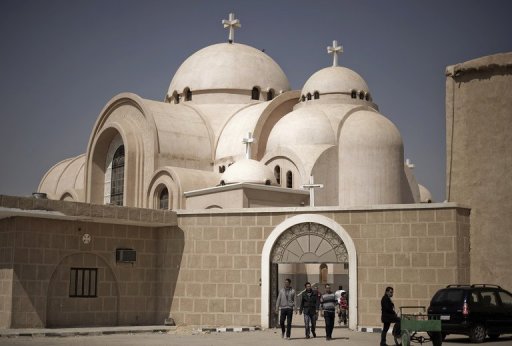CAIRO: Five protesters detained by military and civilian police during the Abbasiya clashes Saturday night, were released on Sunday without any charges filed against them.
Ahmed Ragheb director of the Hisham Mubarak Law Center said that the Supreme Council of the Armed Forces (SCAF) and the government were responsible for securing the people and preventing the clashes.
"These people were practicing their right to peaceful protests and it’s the responsibility of the country’s rulers to protect them," Ragheb told Daily News Egypt.
However, residents of Abbasiya neighborhood had a different sentiment, blaming protesters from Tahrir Square for igniting the clashes and describing them as "thugs", while others said that the peaceful Tahrir protesters were infiltrated by a group of thugs.
The residents claimed that "thugs" from Tahrir Square went up on the roofs and started pelting their fellow protesters with stones and Molotov cocktails, claiming to be Abbasiya residents.
"How are we supposed to differentiate between the thugs and peaceful protesters?" asked Tamer Hamdy, 36, whose car was destroyed.
One car was torched and at least four other cars were vandalized by hail of rocks during the clashes.
Accountant Rimon Rifaat, whose car was also destroyed, said, "I wasn’t with either side, I just parked my car under my house like any normal citizen."
"It only takes one rock to be thrown on either side to cause these clashes," Rifaat added, saying that he wasn’t sure the violence started.
The protesters refuted media and eyewitnesses’ reports that armed residents surrounded the peaceful protesters and began the attack.
"Why would we torch and break down our own cars?" one of the residents asked.
"We were protecting our neighborhood, and we shouldn’t be called thugs for that," said a driver who preferred to remain anonymous.
Residents also denied claims that the army had called on Abbasiya residents to protect themselves from armed thugs coming from Tahrir Square before the clashes erupted.
They stressed that the army used a great deal of restraint and self-control, although the protesters attacked them with bottles and rocks.
“How can Egyptians attack the army, this country’s savior and protector?" Manal Mamdouh, 40, said in dismay.
They condemned Tahrir Square protesters for obstructing traffic and not giving SCAF the opportunity to execute their demands.
"These people don’t represent us," employee at the Ministry of Health, Ahmed El-Saeid, told DNE, adding that the army is protecting Egypt from turmoil.
Other residents said that SCAF was doing its best to meet the protesters’ demands as swiftly as possible.
"The trials of corrupt figures of the former regime will be public and they’re forming a new government," said one of the residents, preferring to remain anonymous. "What more do they want," he asked.
Many eyewitnesses said that people driving unlicensed motorcycles scouted the neighborhood before the march started.
Hossam Hassan, a butcher who was injured in the head, said that the people riding the motorcycles threatened to attack the residents with larger numbers.
They claimed that the Tahrir protesters came armed with knives, rocks and Molotov cocktails.
"We are honorable, respectable people and we were just defending our families and homes," a mechanic who preferred to remain anonymous told DNE.
A few residents blamed the April 6 Youth Movement and foreign spies for the clashes that erupted on Saturday, echoing a public condemnation of the group by the SCAF’s 69th statement which was published late Friday night.
"Where do April 6 get their funding from?" accountant Mahmoud Ali, questioned in line with SCAF’s recent statement accusing April 6 of causing rifts between the people and the army and accepting foreign funds.
"The January 25 revolution toppled the regime and now it’s toppling the state," he added.
April 6 Youth Movement denied SCAF’s accusations likening it to the former corrupt regime, which depended on false accusations to tarnish the reputation of the opposition.
Around 10,000 people held a march from downtown Cairo’s Tahrir Square to the military headquarters on Saturday at 5pm, but were stopped in the eastern Abbasiya neighborhood by a line of army barricades.
Bands of men armed with knives and sticks surrounded the protesters from side roads and attacked them. Street battles ignited in which both sides threw punches and hurled rocks.
Towards the end, riot police fired tear gas to disperse the protesters while military officers stood by to watch.
Some residents condemned the army for not protecting them from Tahrir protesters, who also blamed the army from not protecting them.
Officer Mahmoud Abdel Nabi, said in a phone interview with "Sabah Dream" on Dream TV on Sunday morning, that the army had issued a statement stipulating that protesters from Tahrir Square were heading to SCAF headquarters and there were rumors that they were carrying swords and Molotov cocktails.
Abdel Nabi added that it was apparent that the protesters were peaceful and didn’t have any weapons with them once the march started. He confirmed that the protesters were surrounded by armed men who attacked them and clashes went on for around an hour and a half.
"(This) is a complete crime of incitement," he said.
Activist and member of No to Military Trials Campaign, Salma Saied, said on her twitter account that she felt that the activists were dragged into clashes with civilians although they were provoked.
Ahmed Gharbeya, the brother of one of the activists who was missing for several hours after the clashes, voiced Saied’s concerns in a note published on Facebook.
"The protesters should’ve showed more restraint," he said.
At around 11 pm, protesters left the area under the protection of the army and headed back to Tahrir Square, according to residents.
The clashes left 296 injured, according to the health ministry.

Protesters demanding political change clash with loyalists of the ruling military council near the defence ministry, the headquarters of the Supreme Council of the Armed Forces, in Cairo on July 23. (AFP Photo/Mohamed Hossam)

